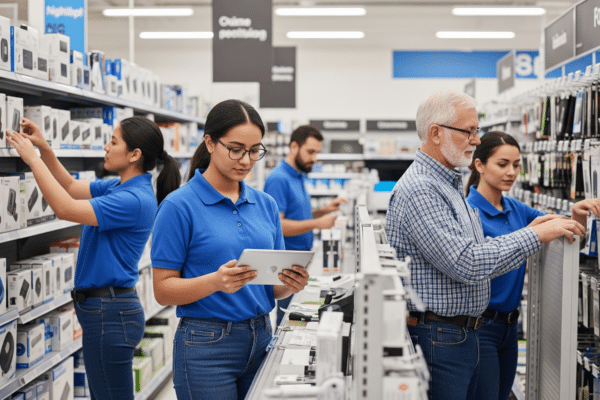
Influencer vs Brand Ambassador Marketing: What’s the Difference?
Brand ambassadors and influencers are both incredibly powerful partnerships for brand promotion. While they have some similarities, they are not interchangeable. You’ll need to understand the intricate differences between these partnerships to decide which is the best fit for your company or product. With the right partnership, you can reach exponentially more customers in a cost-effective manner. So what is the difference between influencer vs brand ambassador marketing?
Who is a Brand Ambassador?
Brand ambassadors are a potent tool for audience reach, exposure, and word-of-mouth marketing. Much like an influencer, brand ambassadors are individuals who advertise your product or service. However, there are some distinct differences that can help you decide what type of marketing you’d like to pursue.
A brand ambassador is an enthusiastic user of your product or service. They organically enjoy your brand and speak highly of your company of their own volition and in their own voice. Brand ambassadors generally are fans of your product before you ever reach out to them about a marketing partnership. They can have a following but do not have to be a celebrity or even particularly popular on any social media.
A business that wants to start a brand ambassador program might reach out to figures who already speak positively about their brand or recommend their product casually. By offering an ambassador partnership, a company often gives free products, discounts, or even exposure to the brand ambassador in exchange for recommending their products in a more formal or targeted way.
An example of this would be a kindergarten teacher with a small following on social media who posts about an educational children’s product she likes using. The company might capitalize on this by reaching out and offering her free products and payment in exchange for her joining their brand ambassador program and sharing about their products more often.
Who is an Influencer?
Similarly to a brand ambassador, an influencer is a person who recommends and speaks highly of your product or service. Unlike a brand ambassador, influencer marketers do not have a previous relationship with your brand. They have not previously posted about your product and may be unfamiliar with or uninterested in your company.
Unlike a brand ambassador, an influencer is, by definition, a well-known figure. While there are different types of influencers with different-sized followings, usually, they are valuable to companies purely for their reach and potential to build brand awareness.
Because the influencer is not already a fan of your product, you will need to offer significant monetary compensation, free products, discounts, or other benefits in exchange for their marketing services. These partnerships are usually shorter in length and may only last for one or two sponsored social media posts.
An example of influencer marketing is an online fitness celebrity with a substantial social media following. A brand may reach out and offer payment and free products in exchange for sponsored content. The influencer will then post a set number of sponsored posts, social media referrals, or other previously agreed-upon content to their audience. This content is usually marked as sponsored content to let the audience know that they are being compensated for their advertising content.
There are also differences between a product demonstrator vs a brand ambassador.
Differences between Brand Ambassadors and Influencers
- Brand Connection – The primary difference between a brand ambassador and an influencer is that brand ambassadors have an organic, previous connection with your brand. Influencers, on the other hand, would not be posting about your service or product without being compensated. Ambassadors will often continue to post and support a brand publicly of their own accord.
- Because of this, brands recruit brand ambassadors as they can be significantly more cost-effective than influencers. They also tend to be more authentic and engaging when speaking about your product or service.
- Public Following – While brand ambassadors can be well-known figures, they are very often not significant, popular influencers or celebrities. Influencers are, by definition, public figures or celebrities. Influencer marketers are chosen precisely because of their reach and audience size – and often paid accordingly.
- Influencer marketing can have a much broader reach and exposure than an ambassador marketing relationship. This can lead to more significant impacts and ROI depending on how well the target audience responds to the sponsored content.
- Formal Agreement – Because brand ambassadors organically recommend products to their followers, they may not have a formal agreement in place with a company they recommend. Even if you partner with a reliable brand ambassador and offer them free merchandise, there is often no set agreement on how often or what kind of content they will produce advertising your brand.
- Conversely, influencers only advertise your product after a formal agreement has been put in place. They will promote only the content you specifically request and for which you compensate them. This can be beneficial because you have more control over what they post, but less effective as they do not produce spontaneous, ongoing content for your brand like an ambassador would.
Similarities between Brand Ambassadors and Influencers
Brand ambassador programs and influencer marketing are both proven tactics that can yield exceptional results when implemented well. They both offer increased brand exposure and engaging advertising content opportunities for your brand.
While most brand ambassadors and influencers advertise and interact with followers via social media platforms like Instagram, Youtube, or Facebook – it is not a necessity. Some successful brand ambassadors or influencers offer real-life advertisements and exposure for your brand. Some examples include a bartender who recommends your liquor brand or a local celebrity news anchor that wears your merchandise around town.
While brand ambassadors often don’t have nearly the social following of influencer marketers, their content can be just as effective for your brand. Because of their authentic, non-sponsored content and intimate relationship with their social media followers, audiences are more likely to listen and act when they recommend a service or product. This means the difference in impact between influencers and brand ambassadors can be very small despite a big difference in follower count.
The benefits of working with influencers and brand ambassadors
No matter who you choose to work with, influencer and brand ambassador marketing strategies are both highly effective ways to reach an audience when implemented correctly. Make sure your target audience aligns with the followers and audience of the individual you partner with. Even when partnering with paid influencers, the return on investment usually means a well-executed campaign is highly cost-effective in comparison to traditional ads- no matter which option you choose.
Neil Patel, a popular marketing guru, reports that user-generated content is 50% more trusted than traditional media marketing. He also notes that 71% of consumers are more likely to make a purchase after seeing a product or service advertised by a figure on social media channels. The Digital Marketing Institute likewise states that 60% of people would consider purchasing an influencer-recommended product if they saw it in a store and that 40% of people have made a purchase after an influencer recommended it on social media platforms.
Which One Should You Work With?
If you find yourself torn on whether to pursue a brand ambassadorship or influencer marketing relationship, you’re in luck. There’s no reason to limit yourself to a single type of marketing. A combination of organic brand ambassadorship and paid influencer marketing can produce an effective and well-rounded approach.
Of course, you may not have the luxury of choosing. Brand ambassadors have an organic relationship with your product or service. You can always try to create brand ambassadors by sending free products to figures you think might enjoy them. Or you can conduct social media research and reach out to relevant communities to encourage brand ambassadors. However, this will always depend on the independent behavior and opinions of the ambassador themselves. Influencers, on the other hand, will almost always be open to a partnership as long as you offer them compensation they are happy with.
In the end, it is up to you to research the potential for each marketing type and decide what is right for your brand. Make sure to keep an eye out on social media for potential ambassadors, but don’t hesitate to partner with an influencer if their audience is a good match. There is no one-size-fits-all approach, and it is up to each individual brand to create a marketing strategy and partnerships that produce the best results for them.
FAQs:
Do you have to be an influencer to be a brand ambassador?
You do not have to be an influencer to be a brand ambassador. Unlike influencer marketing, anyone can be a credible brand ambassador. An ambassador is someone who enjoys a product and shares their options publicly. A brand may compensate them in exchange for their promotion with free products, discounts, or payment. However, anyone who recommends a brand to their network can be a brand ambassador.
What are the 4 types of influencers?
Influencers are typically divided into separate categories depending on their audience size. The four primary types of influencers include:
- Nano Influencers (1k-10k followers) – This influencer type may have a small audience. Still, the intimate follower count means they typically have a strong connection and influence over a large percentage of their audience.
- Micro Influencers (10K – 100K followers) – Micro influencers are larger than nano influencers but still have a strong relationship with their followers and a high engagement rate.
- Macro Influencers (100K – 1 million followers) – Internet celebrities, social media stars, and professional content creators usually fall into this category. They aren’t as famous as a mega influencer but have a bit less engagement than a micro influencer.
- Mega Influencers (> 1 million followers) – Mega influencers are usually celebrities outside of the online space with a strong personal brand. They may be popular actors, models, or musicians and have extremely large online followings.
Is influencer marketing the same as social media marketing?
Influencer marketing is a type of social media marketing, but social media marketing encompasses a much wider range of strategies. Social media marketing includes paid social ads, organic brand content, and paid brand content. Typically influencer marketing and brand ambassador marketing have stronger engagement and response rates than other types of social media advertising. This is because paid social or brand-produced content lacks the personal relationship and trust an influencer or ambassador has with their audience.
How To Partner With Brand Ambassadors
Locating and successfully launching a partnership with brand ambassadors can be a challenge. Luckily, T-ROC offers cutting-edge social technology solutions and expert-guided strategies to maximize your ambassador program’s success. With educational training for ambassadors and a proven track record of success, T-ROC can help your business launch a successful ambassador marketing program with minimal cost and rapid startup time.








